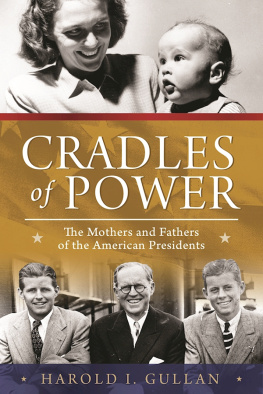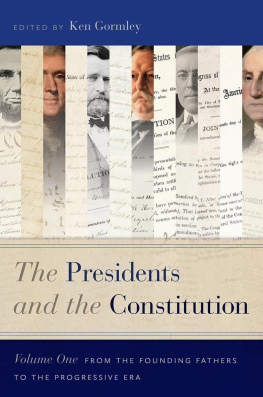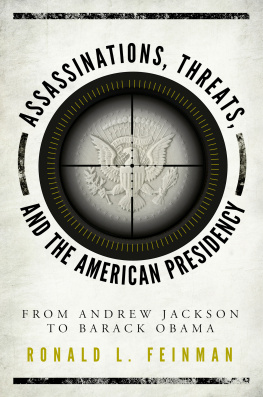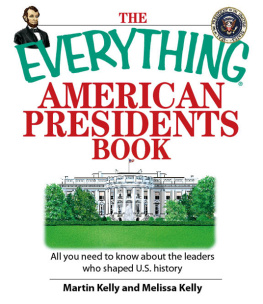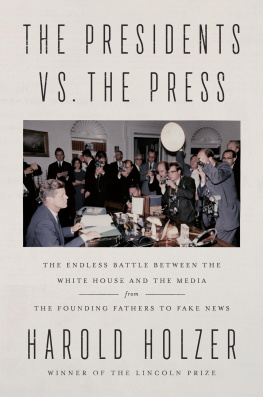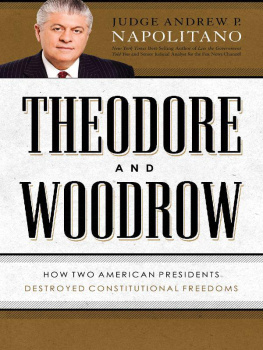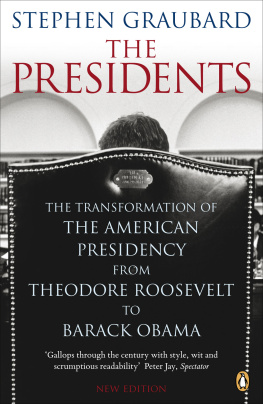Copyright 2016 by Harold I. Gullan
All rights reserved. No part of this book may be reproduced in any manner without the express written consent of the publisher, except in the case of brief excerpts in critical reviews or articles. All inquiries should be addressed to Skyhorse Publishing, 307 West 36th Street, 11th Floor, New York, NY 10018.
Skyhorse Publishing books may be purchased in bulk at special discounts for sales promotion, corporate gifts, fund-raising, or educational purposes. Special editions can also be created to specifications. For details, contact the Special Sales Department, Skyhorse Publishing, 307 West 36th Street, 11th Floor, New York, NY 10018 or .
Skyhorse and Skyhorse Publishing are registered trademarks of Skyhorse Publishing, Inc., a Delaware corporation.
Visit our website at www.skyhorsepublishing.com.
10 9 8 7 6 5 4 3 2 1
Library of Congress Cataloging-in-Publication Data is available on file.
Cover design by Rain Saukas
Cover photos: John F. Kennedy Presidential Library and Museum; George Bush Presidential Library and Museum; Franklin D. Roosevelt Presidential Library
Print ISBN: 978-1-5107-0533-3
Ebook ISBN: 978-1-5107-0534-0
Printed in the United States of America
This book is dedicated to
Grace Elizabeth Gullan
and
Winston Lakin Gullan,
either of whom might one day be elected president.
Contents

Where Im Coming From

H arry Truman once said that the only new thing in the world is the history we dont know. Im reputed to be a historian. Yet when I embarked on this remarkably neglected subject, I readily realized just how little I knew. Yes, Washington didnt get along with his mother and Lincoln with his father, Sara Roosevelt and Joseph P. Kennedy were domineering, Miss Lillian Carter was a character, Abigail Adams was (thankfully) given to recording her thoughts, and Gerald Ford and Bill Clinton had stepfathers who couldnt have been more different.
But what of all the others? Why have we had so many books about first ladies and so few about first parents? Indeed, to my knowledge, this is only the second one ever to tell the stories of both our first mothers and first fathers all within a single set of covers. And what stories many of them are! No, not every parent provided the earliest inspiration to a favored son who eventually became president, but many did. And just as many were remarkable in their own right. Consider the heroic mother of Andrew Jackson, who literally saved his life. Or the senior Theodore Roosevelt, who seemingly founded and funded every worthwhile charity in New York. The parents of our presidents have been as varied as American parents generally, and their stories form a compelling component of American historythe history so few of us know very much about.
John F. Kennedy once said that every American mother wants her son to be president. She just doesnt want him to be in politics. Actually, he was wrong on both counts. The only American mother who, at least near the end of her life, wanted her son to be president was Abigail Adams. She simply felt that the nation needed him. His father, John, who had been president, preferred to see John Quincy return to join him in a law firm so the family could finally make some money.
Rose Fitzgerald Kennedy came from a family steeped in politics and campaigned vigorously for all her sons, but she had also hoped that Bobby would enter the priesthood. The only first mother who specifically wanted her son to be in politics was Rebekah Baines Johnson, but she intended that Lyndon should run for Congress and nearly drove him crazy promoting it. By the way, note how many of our presidents have had their mothers maiden names as their middle names, indicating their importance. In Woodrow Wilsons case, after he abandoned Thomas as being too undignified, his mothers maiden name became his first name, as was the case with Millard Fillmore.
Well, what did all the mothers of our presidents really want for their sons? Simply, like all mothers, that they should lead fulfilling lives. However, if pressed for a specific profession, they would have chosen the ministry. Mother McKinley (popularly called that throughout the nation) even had a particular goal in mindthat William should one day become a Methodist bishop. Alas, she had to settle for the White House. The only president who actually studied for the ministry was Woodrow Wilson, and he changed his career goals after his freshman year in college.
What of the first fathers? Except for those with inherited wealth, they were all ambitious, although only about half were successful in their business ventures. Many hoped their sons would join them in expanding these enterprises; but barring that, the preferred profession was the lawand not as a way to enter politics. Of our forty-three presidents, only a dozen havent pursued a legal career, although not all proceeded to practice the profession. Yes, Joseph P. Kennedy Sr. wanted one of his sons to be president, but his first choice had been himself.
What I have tried to do, in so necessarily brief an account, is not to dwell on the detailed biographies of each individual parent or the policies of each future president. My concern is less with precisely what they did than with why they did it. Theirs is a shared story combining many separate stories of parents and children. Only these particular children became presidents. Who and what most influenced each of them during his vital formative years? Growing up, how did each interact with his parents? How did their own experiences, values, and character influence his? Of course, we know much more about some families than others. Hopefully, this book of intertwined stories will add some modest insight into the American story we all share.
Please join this voyage of discovery. Consider, for example, the inspiring Ida Eisenhower and Martha Truman, the resourceful Lucy Hayes and Eliza Garfield, the supportive John Coolidge, and the venturesome Samuel Polkjust to name a few. Even some parents not so highly esteemed by their sons made critical decisions affecting their lives and ultimately the nation. For example, suppose Ulysses S. Grants father had not insisted that his son, against his will, attend West Point to find some focus for his life? Would we have ever heard of him?
Its all a part of the history we should know. Thank you for sharing your own conclusions, and enhancing mine.
C HAPTER 1
Foundations of IndependenceMary and Augustine Washington

I was early denied of a father, the adult George Washington reflected. He had also been denied the educational opportunities his half-brothers had received. His father, Augustine, had died too young to specify them in his will. George was only eleven. All his life, the father of our country felt deeply his lack of intellectual attainments, an opinion shared by the other founders, however much they esteemed Washingtons importance in unifying their fragile new nation.
Miriam Ann Bourne suggests that even given so few years together, it is inconceivable that so energetic a man as Augustine Washington would not have had some influence on his best-known son. Whatever the extent of that influence, Paul Longmore concludes, Perhaps we can see in the loss of his father George Washingtons extraordinary drive for public fame. In either case, the public image Washington crafted for himself came out of both what hed lost and what hed sought. The tall, dignified silent figure wearing his old uniform at the Continental Congress was the picture of resolve, in itself a call to action and an offer to lead.

